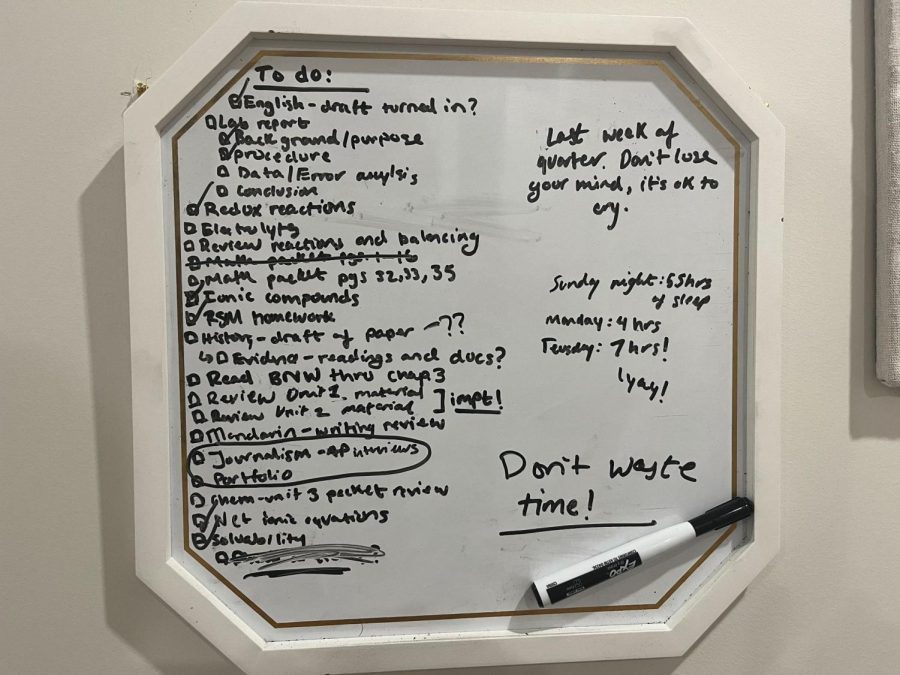Opinion: Hi, I’m burnt out, but let’s pretend I’m not
Credit: Reva Datar
WSPN’s Reva Datar discusses how much pressure students are under, and how burn out is a common thing for many, including herself.
November 14, 2022
I’ve been standing in the same spot in my bedroom for the past ten minutes. Tears are streaming down my face, and I’m laughing quietly, hysterically to myself. It’s past 10 p.m., and I haven’t started my homework.
This isn’t being a bad student. It’s not an immature kid’s neglect sidetracking them, and it’s not them taking their education for granted. It most definitely is not a kid fooling around, procrastinating their work until the very last minute. Rather, it might be the very opposite. It’s burnout.
For me, my burnout is the result of everything contradictory to being a bad student. I’ve been prioritizing my academics over everything else in life. Sports, music, friends and family have all been compromised for the sake of academic glory. I’m organized and diligent. I write down everything I have to do that night when I get home, and I check things off as I go.
Perhaps this hyperfocus has made me so obsessed with school that I’ve paralyzed myself. I’ve created a picture of what I aspire to be, and the pressure I’ve put on myself to get there has frightened and intimidated me.
You could say that I chose this for myself, and I’d probably agree with you. It’s true, I chose to take all honors classes while playing a sport and instrument while balancing multiple clubs. I knew that I would be spending more time on school, studying late into the night and having to cut time out of sleep and my social life to make time for academics. What I failed to realize each time I challenged myself was the mental and emotional toll my choices had on me.
This poses an important question: Is taking rigorous academic courses inherently accepting a compromised mental health? Since I’ve conditioned myself to believe academic achievement is the true validator of my identity, it seems that I’m trading in my sanity for academic success.
When it’s the end of the quarter, this is especially true. On top of regular homework assignments, there are tests to study for and essays to turn in, all of which could make or break a student’s quarter grade. A few weeks ago, I, and many others around me, had been saying much too frequently that this had probably been the worst week of our lives. All of us were losing sleep. For the past week, I’ve gotten 30 hours of sleep, if not less. I’ve heard the phrases, “I can’t do this anymore,” and “I am going to kill myself,” a disturbing amount of times.
Recently, I’ve noticed that energy levels in classrooms have been down, and people can’t seem to stop talking about the homework they have or the amount of sleep they don’t have. It’s an undisputed fact that a lot of students were struggling the last week of the first quarter, and students were in a worse place mentally than they have been in a while.
My head is also all over the place. During history, I’ll be scrambling to finish my algebra homework under the table. I’ll become restless thinking about all of the studying I have to do for tests and other assignments that have to be completed on top of that. It seems that during moments where I need to be giving my all, I am the most unstable and disoriented.
This isn’t just applicable to the end of the quarter, but can also be an issue during other parts of the year. Things like a bad test score after studying for hours on end make me feel discouraged, and I question the value of my effort. It can be hard to see the purpose of all the studying I do when results I get aren’t indicative of that. In fact, it can be hard to enjoy school when the only permanent thing I’m getting out of it are the grades. At this point, I’m feeling exhausted and exasperated, and rightfully so.
It’s not always easy to bounce back when things get hard. I come home from school, feeling defeated after a hard day, and it’s even harder to get started on homework. Getting started late means staying up late, which correlates with no sleep. On the other hand, if I decided to go to sleep early that night, forgetting to study a certain subject, I’d feel unprepared. The cycle continues, on and on. I’m only human, so I become unhappy, impatient, desperate for a break, and most importantly, I seek reassurance.
However, it’s hard to take a break knowing all of the work that still needs to be done. The simpler route is to just try and do as much as I possibly can, which again tires me out. This is when my mental health starts to deteriorate, and negative thoughts and criticism make their way into my life and tire me out more than anything. These thoughts become suffocating.
So, the next time you or a friend says something like “I’m not going to be able to sleep tonight,” or “I want to die,” don’t just brush over it because you’ve become numb to those sentences. That person, whether it be you or someone else, might truly be struggling with their mental health because of the stress in their life. Though you might not be able to change the amount of homework they have, or how much sleep they get, you can offer whatever moral support you can. These words of encouragement can make the hardest week of someone’s life become a bit more manageable.





![Last Wednesday, the Wayland School Committee gathered to discuss a number of topics regarding the health curriculum and Innovation Career Pathway course. Another large topic of conversation was the ways to potentially mitigate distracting cell phone usage. "These [phones] are going to distract your learning and social relationships," Superintendent David Fleishman said. "That's concrete right there."](https://waylandstudentpress.com/wp-content/uploads/2025/06/Screenshot-2025-06-04-at-9.49.31 PM-1200x886.png)

























